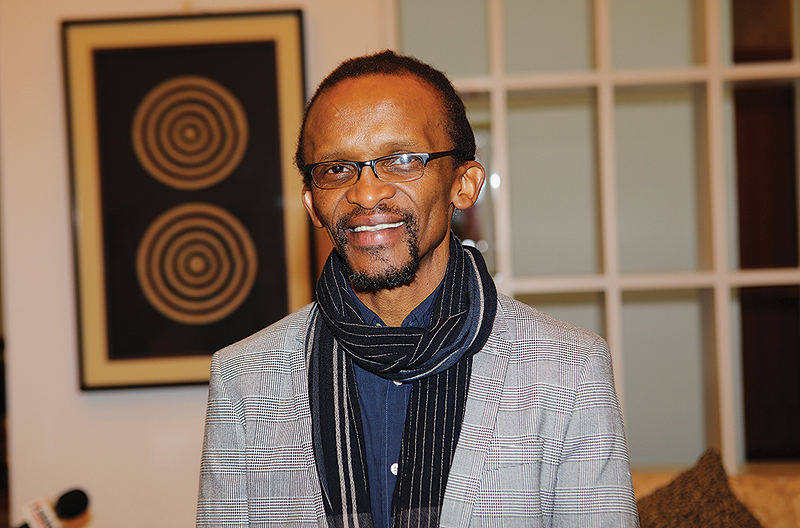A look at the life and influences of the famous jazz artist

McCoy Mrubata is a renowned, multi-award winning South African saxophonist, flute player and band leader. His childhood was surrounded by African hymns, the sounds of Zion churches and the brassy music of the Merry Macs band that used to rehearse opposite his home. His ambition is to keep jazz music alive in home country and share his South African experiences through music with the rest of the continent and the world. Outside of the music, he considers himself a proud and grounded family man with four children. This legendary jazz musician and his group performed in Salmiya's Abdul Hussain Abdul Redah theatre on Tuesday night. Kuwait Times conducted an interview with him when he was invited by Mzolisa Bona, the Ambassador of Republic of South Africa at his official residence a night before the concert.
Kuwait Times: You grew up in a pretty turbulent time in your home country; did those times influence you to become a musician and your music itself?
McCoy Mrubata: It influenced me a lot. I come from a township that was very musical and there was protest in music as well. We use to regularly play in rallies back in the days. It's where I fell in love with music and it's where I told myself "I am going to be a professional musician one day".
KT: But why jazz in particular? You've spoken about your Zionist influences early on in your career, was jazz and reggae gaining a lot of popularity in South Africa during that time?
Mrubata: Yes most definitely. As much as I am known as a jazz musician, I have also played with Lucky Dube who is a reggae musician and Rastafarian and have played in many rock bands. I consider myself an 'open-minded' musician but jazz simply found me. I was surrounded by jazz as my parents played jazz records all the time and I absorbed the music at a very young age.
KT: Who were the artists that inspired you the most?
Mrubata: Oh there were lots of them. John Coltrane and Wayne Shorter were the main ones I would say - followed by many local musicians like Madoda Gxabeka and Winston Ngozi who were coming up at that time. Although they didn't teach me physically, I still regard them as my teachers. I use to watch them all the time to see how they behaved and how they practiced their craft.
KT: Speaking of teachers, you also run and teach in a well-established music school. What are the main elements of music you focus on in your classes?
Mrubata: We specialize in wind instruments mainly but we do focus on teaching theory and other instruments as well just to get them to understand the feel and flow of African jazz.
KT: How do you think African jazz differs from the more commonly known American-infused jazz styles?
Mrubata: African jazz as a lot of elements of African folk music in it. In South Africa, we try hard to make sure this African-side of jazz sounds stronger than the American-infused kind. By stronger I mean, making sure the sound stays upbeat without swinging too much. There's still a tinge to the sound but you can make out the difference. Whenever we tour the US, people there often tell us how they can hear similarities and how we do it differently - we do it in our own way.
KT: After such a long, illustrious career, what's your take on the global appeal of jazz today?
Mrubata: It's still huge I feel. Two months ago, I was touring America with my band and the reception was as good if not bigger than it's ever been. I've also gone to several colleges in the US to teach and give lectures and they're still very attracted to the sound and to the instruments especially the saxophone and clarinet. The current generation tends to mix in some electronic elements into the music which we are more than happy to oblige.

KT: Outside of live performances, have you provided music in other fields?
Mrubata: I have scored a few documentaries and television productions back in my home country. I've also been a part of a musical theatre production in Norway. I acted in a stage show on John Coltrane the great sax player and was also involved in a musical on Bob Marley.
KT: Bob Marley the Musical, what was that like?
Mrubata: It was a live stage musical on the life of Bob Marley, filled with great acting and live musical performances. We mainly focused on his upbringing, his life in Jamaica and how he rose to fame.
KT: Did you cover his assassination attempt as well?
Mrubata: Oh yes that was a part of the show. The playwright was not scared on touching those controversial topics.
KT: Kuwait has seen quite a few jazz artists come to perform in last few years and seen the genre grow a bit in popularity; do you have any personal recommendations or advice for those budding jazz-lovers?
Mrubata: I would say that they should look at jazz from a wider angle. The search for great jazz music shouldn't just end with the USA. If they are interested in my music, from there they could find other artists both in Africa and around the globe. I know America has worked hard to popularize the genre and we're all thankful for that but we too are always working towards widening jazz's reach in the world. I might be too old for open air festivals but I hope I can still be performing 10-15 years down the line and to keep the music going.
By Aakash Bakaya










